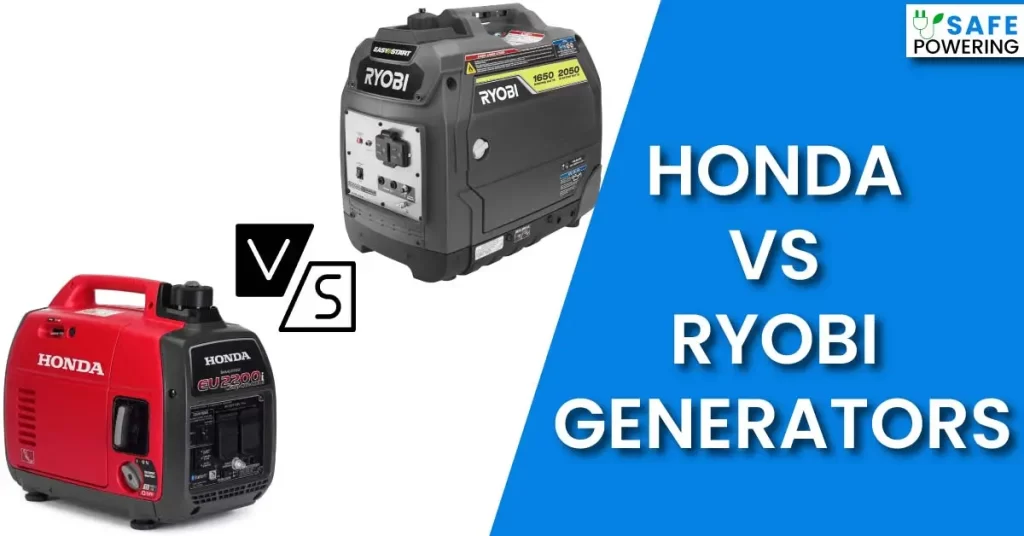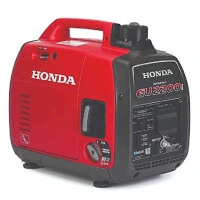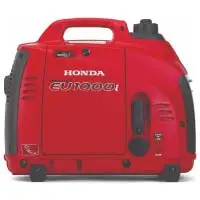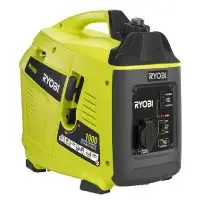Honda Vs Ryobi Generators – Is RYOBI Really Worth The Hype?
In this article, we have written a detailed comparison of Honda Vs Ryobi Generators by testing two generators from the respective brands where we took noise, power output, fuel efficiency, and reliability into account. Overall, Honda won the battle for the price, and RYOBI is a solid competition.
Read the full article for the details.
Honda, known for its quality and reliability, has long been a leader, while Ryobi offers cutting-edge features at affordable prices.
The comparison focuses on power output, fuel efficiency, noise levels, and portability, crucial factors for choosing the right generator.
The analysis covers various models, from compact to heavy-duty units, for different applications.

Honda Vs Ryobi Generators -Brand Comparison
The main differences between Honda and Ryobi generators lie in their reputation and price points. Honda is renowned for its quality and reliability, with a long-standing reputation in the industry. On the other hand, Ryobi offers affordable pricing and focuses on providing cutting-edge features at affordable rates but their generator can be hit miss. Some units last for decades while others break down after a few years.
Let’s talk more about the brands in general.
Honda Brand
Honda has been a big name in the generator and engine manufacturing scene since 1973, making it a trusted player in the industry.
What sets Honda generators apart is their commitment to lasting quality and meeting high standards.
They offer a range of lightweight and quiet inverter generators that are perfect for various applications.
I have personal experience with their generators as my family used an old Honda EG2200X during our camping trips when I was young.
That machine was a real workhorse, always reliable, and we still have it today because of the wonderful memories it brings back.
Honda generators are designed for recreational use ranging from 1000 to 20,000 watts.
Their generators are mainly known for providing ultra-high fuel efficiency, super quietness, eco-throttle modes to save fuel when the load is not great, and CO-sensors to automatically shut down the generator when the carbon monoxide levels are high.
Ryobi Brand
Ryobi is a Japanese Company founded in 1943 by Yutaka Urakami. They started their production of power tools in 1963. So, they have been a major player in the industry for more than 50 years.
Their range of generators offers the following things:
Ryobi has taken great strides to ensure cleaner and safer power with its generators.
Their generators are equipped with advanced technologies like super sensitive AVRs, inverter technology, and stable engines to produce pure sine waves.
What does that mean? Well, it means that their generators have less than 5% of THD (total harmonic distortion), which is really impressive!
In fact, we ran some tests on their latest inverter model, the Ryobi 2300-watt Bluetooth generator, and found that it goes even further by providing less than 3% of THD.
That’s amazing news for those of us who have voltage-sensitive appliances like UPS, mobile phones, and laptops.
With Ryobi, you can trust that your devices will be safe and well-protected.
In short, Ryobi has satisfied millions of customers across the globe despite not being as durable as Honda generators.
Recommended Read: Predator and Honda Comparison
Detailed Comparison
1. Noise:
There is a significant difference in the noise department. After a few noise tests:
- Honda EU2200i has generated an average of 53 to 54dB from 23 feet away at 50% load.
- Honda EU1000i generated 41–41 dBA from 20 ft. away
- Ryobi RYI2300BTA on the other hand gets 10 times louder once it is up and running. It was generating an average of 60 to 67dB from 24 feet away at 50% load.
- RYOBI RYI1000 generated 65 to 66 dBA from 30 ft. away
It is clear that despite being a portable generator, RYI2300BTA is loud. It doesn’t think it is a good choice for quiet camping if you have the option to take another inverter generator with you.
HONDA IS WINNER
2. Power Output:
So, both generators are rated at 1800 running watts, Ryobi RYI2300BTA has 100 extra 100 surge watts (2300) whereas Honda’s surge watts are 3200.
I conducted some load tests of my own after giving both generators as much load as possible.
- Honda EU2200i was able to 2190 peak watts and 1778 running watts.
- Ryobi RYI2300BTA generated close to 1750 running watts and 2195 peak watts.
So, as you can see, there is not much difference in the overall power output. I tried to run as many appliances as possible and both generators held their end of the bargaining.
BOTH ARE WINNERS
3. Fuel-Efficiency:
There is a little bit of difference in the fuel efficiency as a result of the differences in the fuel-tank sizes. EU2200i is equipped with a 0.95-gal fuel tank whereas Ryobi RYI2300BTA is equipped with a 1.2-gal tank.
Based on our tests, the following were the results:
- Honda EU2200i: 8.2 hours @ 25% load.
- Honda EU1000i: 8.3 hours at 25% load
- Ryobi RYI2300BTA: 10.5 hours @ 25% loads.
- Ryobi RYI1000: 8.2 hours at 50% load
RYI2300BTA is a super fuel-efficient generator there is no doubt about that, but if we take fuel-tank size to the runtime ratio, it is almost the same as Honda EU2200i.
Honda generators are typically more efficient than the competition but this time, it is a tie.
But, for the 1000W generators, Honda EU1000i is miles above Ryobi RYI1000.
HONDA IS WINNER
4. Reliability:
Given the price point, fuel efficiency, and features, Ryobi does have a slight edge over Honda.
However, if you can afford a quality generator that is not only durable but super quiet as well, Ryobi can’t stand up to Honda generators.
Both are reliable in their own rights; the differences are the price point and noise.
BOTH ARE WINNERS
Recommended Read: Champion and Honda Comparison
RYOBI Vs Honda Generators – Model Comparison
We tested two models from the respective brands several times by running several appliances at a time to get as accurate data as possible.
Honda EU2200i Vs Ryobi RYI2300BTA
| Specifications | Honda EU2200i | Ryobi RYI2300BTA |
| Image |  |  |
| Type | Inverter | Inverter |
| Peak watts | 2200 | 2300 |
| Running watts | 1800 | 1800 |
| Engine | OHV, 4-stroke, single cylinder, 121cc | OHV, 4-stroke, single cylinder, 180cc |
| Fuel tank | 0.95 gal | 1.2 gal |
| Noise | 57 dBA from 23.5 feet away @ 25% load | 57 dB at 25% load, 67 dB at full load |
| Runtime | 8.1 hours @ 25% load | Up to 10.5 hours @ 25% load |
| Outlets | x2 120V AC 15A outlets, 1 x DC 12V outlet | 2 x 120V AC 20A outlets, 2 x USB ports, 1 x 12V DC outlet |
| Starter | Manual recoil | Electric, manual recoil |
| Weight | 47.4 lbs. | 54 lbs. |
| Dimensions | 20 x 11.4 x 16.7 inches | 23 x 14.4 x 20.3 inches |
| Warranty | 3-year warranty for residential and commercial use | 3-year limited warranty |
| Eco-mode | Yes | Yes |
| CO SENSOR | Yes | No |
| Parallel connection | Yes | Yes |
| Price | Check Price | Check Price |
Both generators offer similar running power, with 1,800 watts, but the Ryobi has a slight advantage with 100 watts more in surge power which is not that great.
Based on my load tests, Honda EU2200i was able to have 2190 peak watts and 1778 running watts.
Ryobi RYI2300BTA on the other hand, generated close to 1750 running watts and 2195 peak watts. Both are head-to-head in the power output department.
One notable difference is the run time. The Ryobi generator has a larger fuel tank, 1.2 gallons compared to the Honda’s 0.95 gallons, allowing it to run for 10.5 hours at a 25% load.
Honda can run for 8.2 hours under the same conditions.
In terms of outlets, both models provide two 120-volt outlets for general power needs.
However, the Ryobi RYI2300BTA also includes a pair of USB outlets, while the Honda EU2200i has a 12-volt DC outlet.
The Ryobi generator takes a step further with an LCD display for monitoring power draw and remaining runtime, a feature the Honda EU2200i lacks. I love this feature; it makes my life way easier.
Portability-wise, the Ryobi generator takes the lead. It may be slightly heavier than the Honda, but it comes with built-in wheels and a telescoping front handle for easier transport.
The Honda generator requires manual lifting using the top handle.
In terms of modern features, the Ryobi RYI2300BTA generator offers a remote electric start and Bluetooth connectivity, allowing you to control it using the free GenControl app on your phone.
The Honda EU2200i, in contrast, only offers a traditional recoil starter.
One area where the Honda shines is noise production. The EU2200i produces a maximum of 57 dB of noise at full power, while the Ryobi generator starts at that noise level and gets significantly louder at full power.
Considering the price, the Ryobi RYI2300BTA generator is a favorable choice for occasional users.
However, if you can afford a genuine Honda generator that is ultra-durable, Honda EU2200i should be your first choice.
Recommended Read: Wen and Honda Comparison
Honda EU1000i Vs RYi1000
| Specifications | Honda Inverter Generator | Ryobi Inverter Generator |
| Image |  |  |
| Type | Inverter | Inverter |
| Peak watts | 1000W | 1000W |
| Rated watts | 900W | 900W |
| Engine | Honda GXH50 4-stroke air-cooled OHV | Ryobi single-cylinder 4-cycle OHV |
| Displacement | 49.4cc | 54cc |
| Fuel tank | 0.6 gal. | 0.6 gal. |
| Run time | 8.3 hours at 25% load | 8.2 hours at 50% load |
| Outlets | (1) 15A 125V Duplex; (1) 12V 96W (8A) Automotive | (1) 20A 120V AC; (1) 12V DC Automotive |
| Start type | Recoil | Recoil |
| Noise level | 41–41 dBA from 20 ft. away | 65 to 66 dBA from 30 ft. away |
| Dimensions | 17.7 x 9.4 x 15 in | 16 x 12 x 16.5 in |
| Weight | 28.7 lbs. | 35 lbs. |
| Warranty | 2-year limited (residential), 1-year limited (commercial) | 3-year limited (residential) |
| Price | Check Price | Check Price |
The Honda EU1000i and Ryobi RYi1000 generators are perfect for those who require a small amount of power.
Both models are compact and provide 1,000 watts of surge power and 900 watts of continuous power. They are equipped with efficient four-stroke, air-cooled engines.
On the surface, Honda looks more fuel-efficient, but if you only use 450 watts, RYOBI RYI1000 allows you to use 450 watts for up to eight hours, while the Honda generator needs refueling after around five hours at the same power level.
Despite having the same 0.6-gallon fuel tank, the Ryobi’s better fuel efficiency accounts for the longer run time, but only for up to 450 watts.
If we talk about 25% load or 50% load, RYOBI RYI1000 doesn’t even hold a candle against Honda.
In terms of outlets, the Honda EU1000i offers two 125-volt outlets, while the Ryobi generator provides a single 120-volt outlet.
The most noticeable difference between these generators is the noise they produce.
The Honda generator operates almost silently, with noise levels of only 42 dB at a 25% load and 50 dB at full power.
In contrast, the Ryobi model produces 68 dB at a 25% load, making it significantly louder.
Both generators are designed for easy portability, with lightweight construction for convenient carrying by hand.
Although the Ryobi model is slightly heavier, this should not be the decisive factor in choosing between the two.
Ultimately, the choice depends on your preference and budget. The Honda EU1000i is priced at over $850, while the Ryobi generator costs around $470.
If you are looking for a quiet and reliable option that can last for ages, Honda should be your first choice.
However, Ryobi is a budget-friendly alternative that can provide similar performance with a bit more noisiness.
Recommended Read: Comaparison of Honda and Westinghouse generators
Frequently Asked Questions (FAQs)
What Are the Main Differences Between Honda and Ryobi Generators?
Honda generators are known for their exceptional build quality, performance, and durability. They often come with advanced features, lower noise levels, and are generally more expensive. Ryobi generators, on the other hand, offer a good balance between affordability and functionality. They may have slightly fewer features but provide reliable power for various applications.
Are Honda Generators Worth the Higher Price?
Honda generators are worth the price because they are known for their long-lasting performance, quiet operation, and high-quality components. They are built to withstand harsh conditions.
Are Ryobi Generators Reliable?
Ryobi generators are generally reliable. While they may not have the same level of reputation as Honda in terms of noise and durability, Ryobi generators provide dependable power and are suitable for most common applications.
Do Honda and Ryobi Generators Come With Warranties?
Both Honda and Ryobi generators typically come with warranty coverage. Honda generators often offer a 3-year warranty for both residential and commercial use, while Ryobi generators generally have a 2-year limited warranty for residential applications.
Can I Parallel Connect Honda and Ryobi Generators?
Both Honda and Ryobi offer parallel connection capabilities for certain generator models. This feature allows you to link two compatible generators together, effectively doubling the power output.

Fareed, the highly skilled electrical expert, boasts 5 years of extensive experience in proficiently maintaining, repairing, diagnosing, and installing a diverse range of electrical systems.
